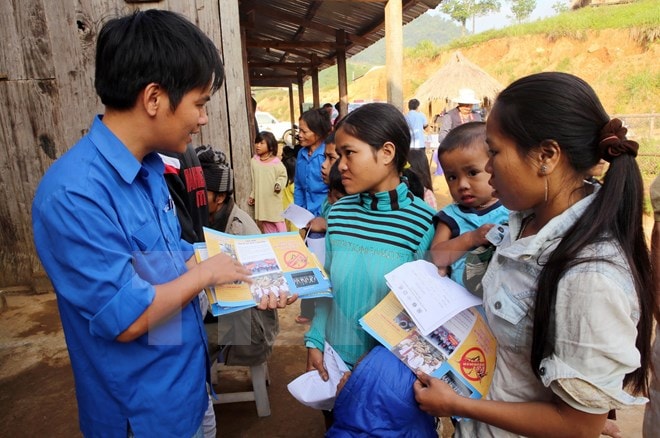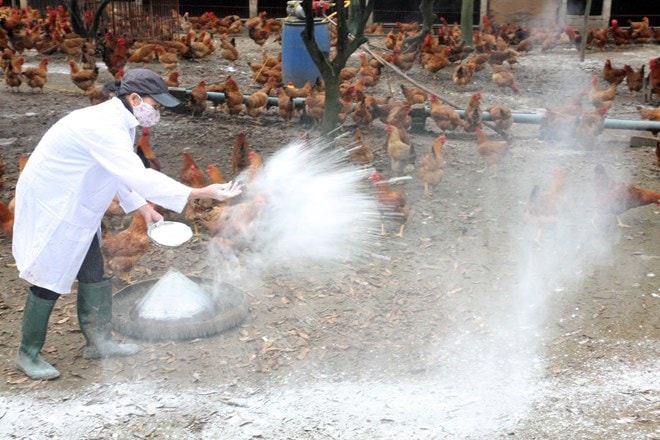Mobilizing the community to prevent new dangerous epidemics
On December 14, the Department of Preventive Medicine (Ministry of Health) organized an interdisciplinary workshop to implement the program "Community joins hands to prevent epidemics" with the participation of representatives of relevant ministries and branches.
The epidemic is complicated
According to the Ministry of Health, in 2014, the Ebola epidemic broke out strongly in West African countries. Avian influenza transmitted to humans, typically influenza A(H5N1) and influenza A(H1N1), continued to record cases in a number of countries.
 |
| Propaganda against dengue fever for people in A Vao border commune, Quang Tri. |
In particular, influenza A(H7N9) detected in China since March 2013 has not been controlled yet and is at risk of spreading to other countries in the region, including Vietnam.
Besides, dengue fever and hand, foot and mouth disease are still prevalent in many countries, especially Asian countries, recording tens of millions of cases and thousands of deaths each year.
Deputy Director of the Department of Preventive Medicine (Ministry of Health) Truong Dinh Bac said that in recent years, Vietnam has proactively and effectively deployed disease prevention measures to prevent the penetration of dangerous emerging diseases such as Ebola, MERS-CoV, plague, and influenza A(H7N9).
So far, Vietnam has not recorded any cases of the disease, but the risk of disease infiltration is very high.
Besides, epidemics such as dengue fever, hand, foot and mouth disease, malaria, rabies, encephalitis, anthrax and some other epidemics still record cases and deaths every year.
The A(H5N1) flu epidemic has been controlled by the health sector and prevented from spreading to humans, but outbreaks in poultry flocks are still regularly recorded.
Malaria is complicated in the Central, Central Highlands and Southern regions; especially with the increase of drug-resistant malaria parasites, chemical-resistant malaria mosquitoes and high risk of outbreaks in some key provinces.
Mr. Truong Dinh Bac also emphasized that disease prevention work in our country is currently facing many difficulties due to the complicated developments of the epidemic situation in the world and the region.
New and emerging dangerous diseases can enter Vietnam due to increased trade and travel. At the same time, although the number of deaths from some infectious diseases circulating in Vietnam has decreased compared to the previous period, they are still at a high level; locally increasing in some provinces and cities.
In particular, Vietnam is located in a tropical climate zone, so geographical, economic, social and environmental conditions are favorable for the development of many infectious diseases.
In addition, people's awareness and practice of personal hygiene, environmental sanitation, food safety, and proactive disease prevention are not high; small-scale livestock and poultry farming practices, slaughtering, buying, selling, and using unsanitary food increase the risk of disease transmission from animals to humans and outbreaks of large epidemics...
Community joins hands to prevent epidemics
According to Deputy Director Truong Dinh Bac, proactive and effective disease prevention depends largely on the specific behavior of each individual and community, and the real attention of authorities at all levels, departments, and organizations.
Therefore, the Ministry of Health has issued the program "Community joins hands to prevent epidemics" for the period 2015-2020.
 |
Sprinkle lime powder to prevent bird flu. |
The program aims to mobilize all levels of government, unions, socio-political organizations, each family and the whole society to proactively and effectively participate in disease prevention activities, contributing to improving people's health.
The specific goal of the program is that 100% of communes, wards, and residential areas have plans and implement the program "Community joins hands to prevent epidemics;" 80% of households proactively participate in implementing recommendations on disease prevention for families and communities; over 95% of schools implement well the National Technical Regulations on prevention of infectious diseases in educational institutions; over 90% of enterprises, production facilities, agencies, and organizations in the area have plans and proactively implement activities under the program...
The program focuses on contents such as effectively integrating the implementation of the program "Community joins hands to prevent epidemics" in the movement "All people unite to build a cultural life in residential areas"; organizing environmental sanitation days to prevent epidemics periodically every week; mobilizing businesses and households to sign a commitment not to transport and trade sick or unknown origin livestock and poultry...
At the workshop, a representative of the Department of Student Affairs (Ministry of Education and Training) said that in the coming time, in order to effectively prevent and control epidemics in schools, the Ministry of Education and Training will continue to strengthen coordination with the health sector in communicating measures to prevent and control epidemics, vaccinations, and recommendations of the Ministry of Health in schools to raise awareness among parents and students.
Organize training for school health workers on disease prevention and vaccination in schools; monitor, inspect, detect, and promptly handle epidemics and diseases, and coordinate activities to implement vaccination in schools...
A representative of the Department of Animal Health, Ministry of Agriculture and Rural Development stated that the units will promote communication in the community, enhance the capacity of disease prevention officers from central to local levels, build pilot models for monitoring diseases transmitted from animals to humans; and at the same time, have a field epidemiology training program.
According to Vietnamplus
| RELATED NEWS |
|---|






